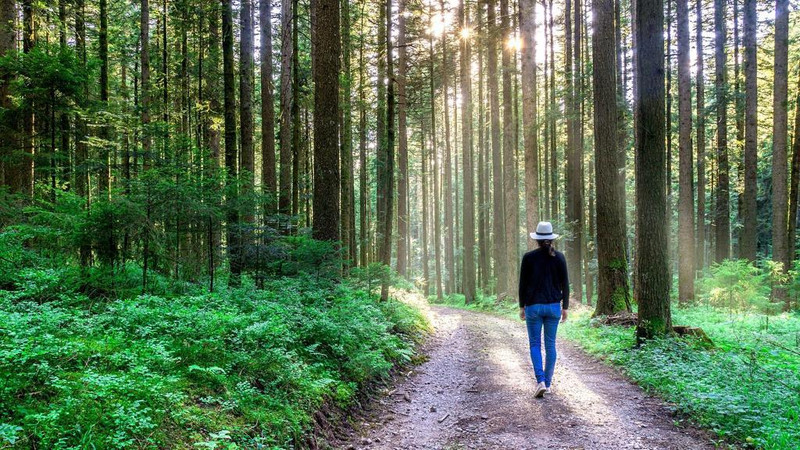As aromatherapy enthusiasts, we already know what a powerful effect our sense of smell can have on your physical and mental health. So, it should come as no surprise to us that using our other senses can also have major health benefits. That’s what forest bathing, or shinrin-yoku is all about. The concept of forest bathing has been around in Japan since the early 1980s, and most of the research on this preventative healthcare strategy comes from the Japanese medical system.
How to do it
Shinrin-yoku is all about using your 5 senses to take in and connect with the natural environment around you. It can be done in a national park, a local forest, your own backyard or even a local park with a few trees. It’s important to leave devices and other distractions behind, and treat forest bathing as a meditative exercise.
Start by listening to your body and taking your time. When forest bathing, don’t attempt to follow any specific route or end up in a specific place— it's better to follow your nose, the sounds around you, or the feeling of what you can touch. If the ground is safe, you can even try the exercise barefoot to further tap into your sense of feeling. Simply take in the experience of nature through your senses; focus on the sound of birdsong, the feeling of sunlight, the touch of trees and plants, the feel of the ground beneath your feet, and even the taste and quality of the air.
Benefits and Research
A US government survey concluded that the average American spends 93% of their time indoors. As a result of our lifestyle, scientists in the last decade have questioned whether some percentage of us are suffering from a “nature deficit disorder” that affects our moods, attention span, and physical health.
In a forest, there are higher oxygen levels which benefit our cardio-respiratory system. Trees also produce “phytoncides”, a type of oil that acts as part of their natural defence system. Both of these factors provide major health benefits to humans, so breathe deep when forest bathing! Phytoncides have been shown to lower physiological stress as well as blood pressure and heart rate. Evergreen forests produce the highest concentration of phytoncides, suggesting that these environments may provide the most health benefits for forest bathers.
Studies on forest bathing have concluded that improved mood, positive feelings, a subjective feeling of recovery or restoration, and a subjective feeling of vitality are all benefits of the exercise.
Dr Qing Li, a leading researcher on forest bathing has performed various studies and written several books on the topic. His research has found forest bathing to be effective at measurably improving quality of sleep, and could potentially be used to address certain sleep disorders.
Alternative, social and preventive therapies are gaining wider recognition in western medicine. The UK’s National Health Service is considering adding forest bathing to a list of non-medical therapies and wellbeing activities prescribed by GPs. These types of integrated approaches to health have been integral to medical philosophies like Ayurveda and traditional Chinese medicine for centuries. It is encouraging that modern science is beginning to confirm the purported benefits of these strategies with clear research, which will hopefully lead us to a more well-rounded approach to health in the West.
For more information on aromatherapy and wellbeing, check out our blog or head to our shop to discover the benefits of aromatherapy for yourself.

